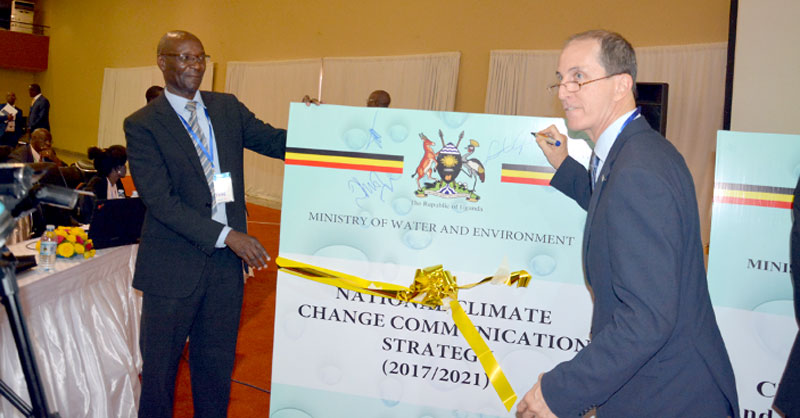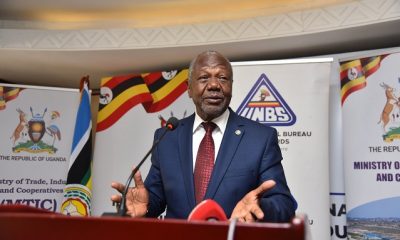Analysis
New climate strategy targets behavioural change

Guenter Engelits of the Austrian Development Agency (right) and Milton Ogeda of the USAID Feed the Future Enabling Environment for Agriculture activity celebrate the launch
The Government of Uganda has launched a new strategy to spread information on climate change adaptation across the country.
The four-year Uganda National Climate Change Communications Strategy and Standard National Climate Change Indicators, were developed with support from the United States Agency for International Development (USAID), will seek to fill gaps on climate change by improving access to sources of information on the phenomenon while also offering solutions to policy makers, farmers and other stakeholders on how to interpret climate change signs and how to respond to different situations.
The strategy was funded by the USAID through a four year plan that will see the US agency support its implementation by main-streaming climate change messages in government planning and budgeting frameworks.
“This new Communications Strategy will ensure that climate information is consistently and widely shared throughout Uganda. The Climate Change Indicators will likewise be critical in tracking the integration of climate change adaptation and mitigation measures in development programs,” USAID said in a statement.
Over the last five years, USAID’s Feed the Future Initiative has helped Uganda’s institutions to prepare and respond to the impact of weather variability on agriculture and improved the potential of private sector and civil society organizations to contribute to policy decisions related to agriculture, trade, and adaptation.
Specific Objectives of UNCCCS include; Providing adequate information, education and communication services for effective management of climate change vulnerabilities and risks among the public, vulnerable communities and stakeholders in Uganda by 2021.
Increasing access and utilization of climate change information, knowledge and learning among members of the public, particularly vulnerable communities and key stakeholders in Uganda by 2021.
Establishing two-way communication mechanisms that are appropriate in terms of mode,
channels, and language that is locally friendly at community, local and national level to benefit the public, vulnerable communities and stake holders in Uganda by 2021.
Providing appropriate, relevant and accurate information, content and materials for diverse audiences on climate change among the public, vulnerable communities and stakeholders in Uganda by 2021.
Enhancing the capacity, competences and skills of stakeholders in Uganda in climate change communication by 2021.
Comments


























